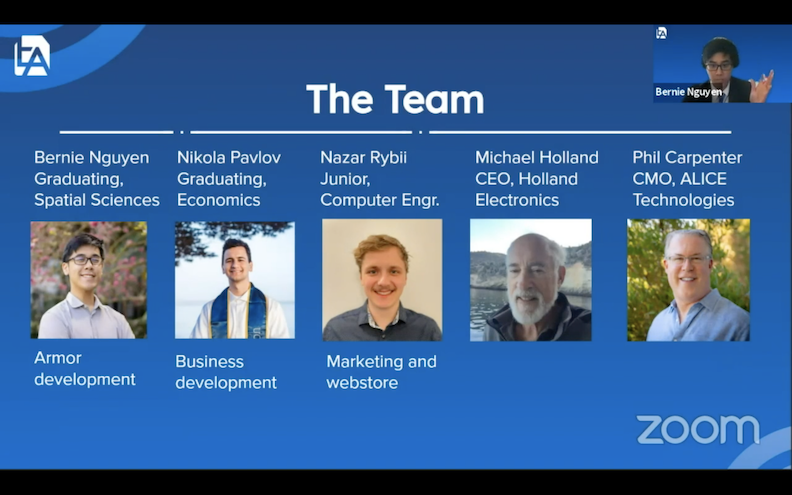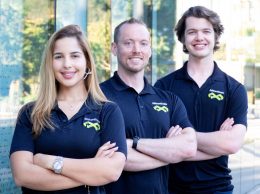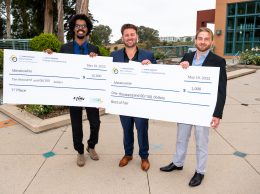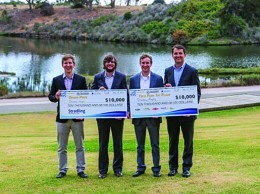Armor startup wins UCSB New Venture Competition
EEL Armor, a startup focused on creating a new and affordable lightweight armor meant to stop the penetration of bullets from assault rifles, won the 2021 New Venture Competition hosted by UC Santa Barbara’s Technology Management Program on May 20.
EEL Armor also won the people’s choice award at the event, helping the company net $15,000 from the competition. The competition was held over online at newventure.live and a replay of the event can be found on the website.
“It’s a tough time to work on a project like this in the middle of COVID and businesses shut down, and market validation and all these efforts being impeded by this pandemic, so congrats to all the teams,” Dave Ardonetto, director of the New Venture Competition, said during the livestream.
EEL Armor’s lightweight armor had a lightweight ceramic design, allowing police officers and military members to move more quickly, while still having the same stopping power as other armors on the market.
Bernie Nguyen, a graduating UCSB senior who developed the armor and gave the presentation, said his team noted during interviews with officers and other security personnel that many of them are not given armor plates capable of stopping rounds from an assault rifle. They have to purchase those on their own.
“What they all wanted was a product that offered an incredibly low weight, effectiveness against the greatest threats, and it’s something that they could afford,” Nyguen said.
Generally, the lighter an armor gets, the more it costs. Low-weight armor can range from $600 to $1,000 a set, according to research presented by Nguyen.
EEL Armor’s product will cost just $480 a set, Nguyen said.
“We’re getting ready to bring accessible innovation and offer better life-saving products to those who need it the most,” Nguyen said.
EEL Armor has an exclusivity agreement with the manufacturer, and the product will go to market once it is complete, Nguyen said.
The company will focus first on selling to patrol officers and private security, but and hopes to bid for military contracts later.
In second place in the New Venture Competition was Tesserol, a company that manufactures ethanol fuel cells to power commercial drones for delivery, agriculture and surveillance.
Tesserol netted $8,500 for also winning the Best of Fair competition earlier in the year.
Athith Krishna, a PhD student at UCSB in electrical and computer engineering and a member of the Tesserol team, said the commercial drone market is set to reach $60 billion by 2027.
What sets Tesserol’s fuel cells apart is that they are much more efficient than the current standards. Krishna said the fuel cell would last six months even if the drone was running 24 hours a day.
This is equivalent to 1,800 charge cycles at $1.08 per charge cycle used. A lithium polymer battery lasts 300 charge cycles at a cost of $4 per cycle while a typical hydrogen fuel cell also offers 1,800 charge cycles, but at $7.78 per cycle.
Ultim, a cloud-based software platform to locate lost luggage in the commercial airline industry, won third place and $5,000.
Vivek Adarsh, a PhD student studying computer science who delivered the Ultim presentation, said lost luggage in the commercial airline industry is an $18 billion problem.
“We quickly uncovered our discovery by speaking to the airline industry that the industry is aware of this problem and they are quick to admit it as well,” Adarsh said. “The reason we lose baggage is because of the underlying infrastructure limitations.”
Ultim’s platform would offer end-to-end monitoring, a unified database management system for instant tracking access, and automation.
This summer, Ultim has a fully funded pilot program with United Airlines at Chicago O’Hare International Airport.
Honorable mentions at the competition included Aquipur, Scopen and Solaris. Each honorable mention winner received $2,500.
Aquipur is a water filtration system that aims to be both cheaper and more efficient than existing systems.
Scopen offers a portable wireless oscilloscope that provides visual signal measurement to any computer or smartphone in any location, which would greatly reduce the need for expensive equipment at medical locations.
Finally, Solaris is aiming to build a fully functional drone that can deliver high-resolution images and real-time footage to farmers to analyze pest and weather threats.













